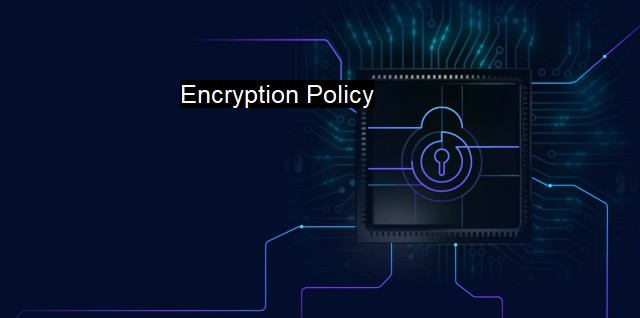What is Encryption Policy?
Understanding Encryption Policies and Their Role in Cybersecurity and Antivirus Protection
Encryption policy, within the context of cybersecurity and antivirus products, refers to a set of rules and guidelines that govern how data and information are translated from a readable format into an encoded version. This data can only be decrypted or translated back through an encryption key.Encryption plays a vital role in cybersecurity by protecting information from being accessed by unauthorized individuals. Encrypting data renders it unreadable without the appropriate decryption key. Encryption isn’t merely a modern concept. It has historical precedence dating back to the era of ancient Rome and Egypt, where symbols and signs were used to deliver secret messages. In today's digital age encryption has taken on a more sophisticated and critical role.
Encryption is indispensable in preserving the integrity, confidentiality, and accessibility of data. This protection goes beyond just sensitive information such as payment details or personal identification information (PII), but extends to all forms of data shared across networks, be it through email, cloud storage or company databases. Encryption minimizes the risk of data breaches, identity theft, corporate spying and various other cyber threats.
An encryption policy is essential in establishing a strong cybersecurity strategy. It defines the method and extent of encryption measures applied within an organization, sets rules for key access and distribution, and details how encryption will help meet specific regulatory requirements.
One common encryption policy is the enforcement of end-to-end encryption in data communication. This method ensures that not only is the data secure while in transit, but it also remains arrow guarded methodactions at the endpoints. In other words, the data remains encrypted until it reaches its intended recipient.
Another widely implemented policy is the requirement for the storage of data at rest to be encrypted. This guards against unauthorized access if a device is lost, stolen, or disposed of improperly. Therefore, even if an outsider obtains the data, they cannot access the information within without the necessary decryption key.
Usage of strong, complex and unique encryption keys is an essential element embedded encryption policies. Cipher algorithms and key generation processes should be robust to ensure that keys are not easily compromised or reproduced.
In an encryption policy, a provision should also be included for key management. This entails the secure storage, distribution, and disposal of encryption keys. Strict controls should be implemented over who can access the keys, with a clear record of all actions involving those keys.
An all-embracing encryption policy should include plans for regular reviews and updates. It is crucial that the policy remains up-to-date and adjusts in line with the evolution of cyber threats. Outdated or poorly managed encryption can lead to unprotected data, making it an easy target for cybercriminals.
There’s no doubt that maintaining an encryption policy involves meticulous planning and administration. Nonetheless, it is an investment that provides significant returns in the form of protection and risk mitigation against cyber threats.
An encryption policy outlines the encryption mechanisms to be applied to protect a company's data. It is a key component in any cybersecurity regime, emphasizing the secure management, transmission, and storage of data, alongside rules governing the generation, distribution and disposal of encryption keys. it serves as a roadmap to compliance with data protection laws and regulations and signifies an organization's commitment to data privacy and safety against cyber threats. Through successfully designed and implemented encryption policies, enterprises stand to considerably reduce their exposure to any malicious cyber activities.

Encryption Policy FAQs
What is an encryption policy?
An encryption policy is a set of guidelines and rules that an organization follows to protect sensitive information by encrypting it. The policy outlines the procedures for implementing encryption, the types of data that need to be encrypted, and who has access to the encryption keys.Why is an encryption policy important for cybersecurity?
An encryption policy is crucial for cybersecurity because it provides a framework for protecting sensitive data from unauthorized access. Encryption helps to ensure the confidentiality, integrity, and availability of data by making it difficult for hackers to decrypt and access sensitive information.What are some best practices for creating an encryption policy?
Some best practices for creating an encryption policy include identifying the types of data that need to be encrypted, determining the appropriate encryption methods based on the sensitivity of the data, defining who has access to the encryption keys, and ensuring that the policy is regularly reviewed and updated to reflect changes in the threat landscape.What role does antivirus software play in an encryption policy?
Antivirus software can play an important role in an encryption policy by providing an additional layer of protection against malware and other security threats. By scanning files for viruses and other malicious code, antivirus software can help prevent attackers from gaining access to sensitive information that has been encrypted. Additionally, antivirus software may also include encryption capabilities to further protect data from unauthorized access.| | A | | | B | | | C | | | D | | | E | | | F | | | G | | | H | | | I | | | J | | | K | | | L | | | M | |
| | N | | | O | | | P | | | Q | | | R | | | S | | | T | | | U | | | V | | | W | | | X | | | Y | | | Z | |
| | 1 | | | 2 | | | 3 | | | 4 | | | 7 | | | 8 | | |||||||